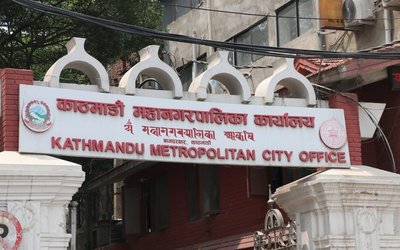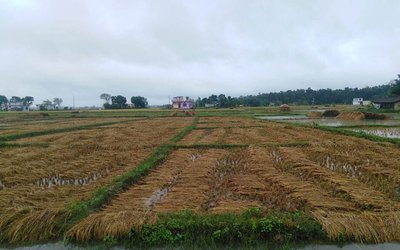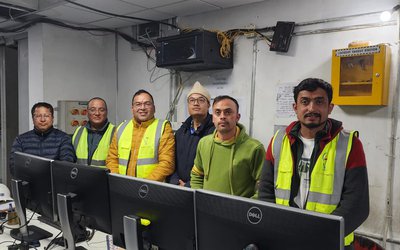The MaHafarm in Jitpur-Phedi uses, for the first time in Nepal, an irrigation system that increases productivity, allowing more harvests per year: the drip irrigation system, which was previously unknown in Nepal. A co-operative of twelve Nepali farmers started the farm a year and a half ago, after working for six years in Israel. Many Nepali people go abroad to countries such as Israel, Qatar and Dubai in order to find well-paid jobs, because Nepal lacks them.
“A manpower company gave us a visa to go and work in the agriculture sector in Israel and earn a good salary, so we decided to go. We worked for six years there and gained a lot of knowledge about the Israeli agriculture systems,” said one.
Many people stay abroad, and send money home. But the founders of MaHafarm, named after two renowned actors, returned to their home country to use their newly learnt skills for the benefit of Nepal.
“In Nepal, farmers only produce tomatoes for some two to three months, but we continue to produce tomatoes during the whole year using the drip irrigation system. Other people get from one plants four to six kilo, but, for the first year, we got 25 kilo from one plant by harvesting four to five times a year at most,” says Katuwal.
Before the use of the drip irrigation system, water could not be equally divided. The system consists of a hose with little holes in it, through which the water drips equally over every plant. In Nepal, the pipe that is necessary is not available. It comes from India, and therefore is quite expensive. But Katuwal is very pleased with it.
“This is a very easy system; with little water we can irrigate many plants. The system is world class,” he says.
Additionally, the farm uses nurseries. Cauliflower, green vegetables, pumpkins… all vegetable harvests have improved with the system. The MaHafarm currently uses Nepalese seeds, but Israeli ambassador Hanan Goder- Goldberger told the group that he would bring Israeli seeds in the future. “We will compare local seeds and Israeli seeds, because everything here is different: weather, water...Next year we will decide after discussing with our technical advisor, which one is better. We keep on learning,” says Katuwal.
The 12 entrepreneurs started with some 20 ropanis of land, and are planning to make the farm bigger very soon. Phedi is an ideal location, because it is very close to the Kathmandu market where they sell their vegetables. Tomatoes are their best product because of the price they fetch, the high demand of the market and the ease of harvesting.
Katuwal dreams of seeing the simple irrigation technique spread to all the farms in Nepal, and every day many people come from far to learn about the system. The 12 friends are proof of a Nepalese success story; that Nepalese who return home and use their experience, money and knowledge from abroad can help their country improve and develop.
Lara is an intern from Belgium
- SWISS SUPPORT: Construction Of A Trekking Trail In Koshi
- Dec 19, 2024
- PM OLI'S VISIT TO CHINA: BRI Agreement
- Dec 16, 2024
- RASUWAGADHI AND SANJEN: Begin Generation
- Dec 03, 2024
- NEPAL, INDIA ELECTRICITY TRADE Nepal's Advantage
- Dec 02, 2024
- PM Oli'S VISIT TO CHINA: Nepal's Dilemma
- Dec 01, 2024
















